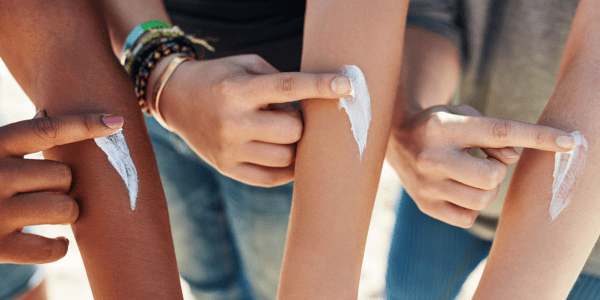- We're Hiring! View Opportunities
- 512-250-5055
Wellness Wednesday: Summer Picnic Safety Tips

Explore the Great Outdoors
June 5, 2024
BKCW Wellness Wednesday: The Health Benefits of Camping
August 7, 2024At some point throughout the summer, you may spend time outside with family and friends at a picnic or backyard barbecue. If you aren’t careful about handling foods and beverages during these cookouts, you’re putting yourself and others at risk for potential food-related illnesses.
The U.S. Centers for Disease Control and Prevention estimates that 48 million people get sick from a foodborne illness each year.
Bacteria multiply especially fast in the summer heat, making outdoor cookouts prime breeding grounds for E. coli and salmonella. Symptoms of foodborne illnesses may include nausea, vomiting, diarrhea, and abdominal cramping.
Prevent food poisoning at picnics and barbecues with these simple tips:
- Clean. Wash cooking equipment, dishes, and utensils between uses. Be sure to clean the grill’s surface after each use and wash cutting boards after preparing raw meat. Germs can survive in many places, so washing your hands and surfaces is critical.
- Separate. Use one cooler for drinks and one for food. It’s also important to separate raw foods (e.g., poultry, seafood, and eggs) from those ready to eat. Lastly, never eat anything left out of a refrigerator or cooler for more than two hours—or one hour if the temperature is above 90 degrees Fahrenheit.
- Cook. Food is safely cooked when the internal temperature gets high enough to kill germs that can make you sick. The best way to know if food is cooked properly is by using a meat thermometer. For example, burgers and hot dogs should be cooked to 160 degrees Fahrenheit and chicken to 165 degrees Fahrenheit.
- Chill. Refrigerate food promptly since bacteria can rapidly multiply if left at room temperature. The “danger zone” for bacteria growth is 40-140 degrees Fahrenheit.
Remember that as summer temperatures rise, so does your risk for food-related illness. If you have a mild case, it’s important to stay hydrated. More serious food poisoning cases, which often include a fever, severe abdominal pain, and dehydration symptoms, require medical attention.
Skin Cancer and You
At least 1 in 5 Americans will develop skin cancer by the age of 70, making skin cancer the most common cancer in the United States. Fortunately, skin cancer is highly preventable by avoiding excessive sun exposure. Here are a few tips to protect your skin from the sun:
- Stay in the shade under an umbrella, tree, or other shelter. Avoid the sun between 10 a.m. and 4 p.m., when the rays are the strongest.
- Wear dark-colored clothes made of tightly woven fabrics and a hat that shields your face, neck, and ears.
- Wear sunglasses to protect your eyes and the skin around them.
- Apply sunscreen all over your body and lips and reapply at least every two hours—and after swimming or sweating. Learn more about picking the right sunscreen in the infographic below.
Most skin cancer cases are curable if diagnosed and treated early enough. Inspecting your skin for any spots or changes in color or appearance is important, as new spots or changes may indicate cancer. If you have any concerns, see your doctor

Choosing the Right Sunscreen
With so many sunscreen options on the shelves, it can be difficult to know which offers the best sun protection. Opt for a sunscreen labeled with these factors:
- Mineral formula (e.g., titanium dioxide and zinc oxide)
- Broad spectrum
- SPF 30 or higher
- Water-resistant for up to 40 or 80 minutes
Avoiding Artificial Sweeteners for Weight Loss
The World Health Organization (WHO) released new guidance to avoid using zero-calorie nonsugar sweeteners (NSS)—such as aspartame and stevia—for weight loss. The WHO advised that artificial and natural sweeteners have not been shown to help with long-term weight loss in children or adults. In fact, their use may come with side effects, including an increased risk of cardiovascular diseases and Type 2 diabetes. The agency’s only exception to the recommendation is for individuals with preexisting diabetes.
This new guidance doesn’t address consumption safety; it only comments on using NSS for long-term weight loss. However, eliminating sweeteners is the healthiest option. Talk to your doctor if you have diet or disease risk questions.

Whole Grain Strawberry Pancakes
Makes: 7 servings
Ingredients
- 1 ½ cups whole wheat flour
- 3 Tbsp. sugar
- 1 tsp. baking powder
- ½ tsp. baking soda
- ½ tsp. salt
- 3 eggs
- 6 oz. low-fat vanilla yogurt
- ¾ cup water
- 3 Tbsp. canola oil
- 1 ¾ cups sliced fresh strawberries
- 6 oz. low-fat strawberry yogurt
Preparations
- Heat a griddle to 375 F or a greased skillet over medium heat.
- In a large bowl, mix the flour, sugar, baking powder, baking soda and salt. Set aside.
- In a medium bowl, whisk the eggs, vanilla yogurt, water, and oil until well blended.
- Pour the egg mixture into the flour one; stir until moistened.
- For each pancake, pour slightly less than ¼ cup of batter onto the hot griddle or skillet. Cook pancakes for 1-2 minutes or until bubbly on top. Turn; cook the other sides for 1-2 minutes until golden brown.
- Top each serving (2 pancakes) with ¼ cup sliced strawberries and 1-2 Tbsp. strawberry yogurt.
Nutritional Information (per serving)
Total calories: 260
Total fat: 9 g
Protein: 9 g
Sodium: 390 mg
Carbohydrate: 36 g
Dietary fiber: 4 g
Saturated fat: 2 g
Total sugars: 16 g
Source: MyPlate
WEBINAR
Rituals that work: how to gain control of your time
Wednesday, July 31st | 1:30pm CST
A ritual is, by definition, a series of steps that is followed faithfully. Rituals are a tool to help you keep your to-do list updated, calendar managed, and fires extinguished before they start. In this session, Melissa Gratias, Ph.D., an international speaker, coach, blogger, and author, will discuss how you can:
• Maximize your natural human tendencies to follow rituals.
• Customize the most productive ways to start and end your workdays.
• Learn how to stay on track with goals, metrics, and projects.
• Reflect on the importance of flexibility and the trap of perfectionism
Presented by SunLife.




